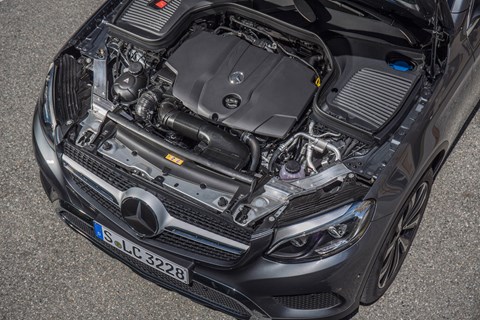► 3m+ Mercedes recalled in Europe
► ECU mods to reduce NOx emissions
► Mercedes currently under investigation
Mercedes-Benz has announced a recall for more than three million diesel cars in Europe, to reduce their nitrogen oxide (NOx) emissions.
It is thought to involve one million cars in Germany, and two million cars across the rest of Europe. How many UK cars are affected is yet to be officially confirmed.
The recalled cars will be modified at Mercedes dealers with a software modification to the engine’s ECU (electronic control unit).
The measure is a voluntary recall, rather than one enforced by regulators as per the VW ‘dieselgate’ scandal of 2015. However, Daimler AG, the automotive corporation which controls Mercedes, is involved in an ongoing investigation by European prosecutors into alleged diesel emissions test manipulation.
Mercedes’ voluntary recall – an effort to ease pressure from investigators?
Jump or push? Mercedes describes the measure as a voluntary recall. However, industry observers have suggested the recall could be a strategic move to alleviate pressure from German regulators, and reduce the potential of being stung by a heavy fine, as per VW’s substantial dieselgate costs.
In the now-infamous VW dieselgate episode, the Volkswagen Group admitted fitting vehicles with ‘defeat devices’ designed to generate favourable exhaust emissions readings during test conditions, and allow more harmful emissions levels when the cars are driven on the road.
Total cost to the VW Group from the emissions fines, rectification and fallout is thought to top £17bn, and could yet rise further.
It has been reported that Mercedes has appointed a consultancy to analyse staff emails and documents to find out whether similar devices to those fitted by VW have been used during its own cars’ emissions tests.
Which Mercedes cars are involved in the recall?
Nearly all diesel models sold in Europe within the last six years, with both Euro5 and Euro6 engines.
Mercedes hasn’t yet officially confirmed which cars are affected, but initial indications are that nearly all engines apart from the new 2.0-litre unit fitted to the current-generation E-class could be involved.
As such, that could include: A-class, CLA and GLA models, B-class, C-class, CLS, G-class, GLC, GLE, GLS, S-class, SLC and SLK, and V-class models.
Certain Infiniti and Renault models are also fitted with Mercedes diesel engines, but there’s no word yet as to whether they’ll be subject to a recall.

‘Service action’ began in March 2017
Mercedes has offered the NOx reduction measures to owners of compact cars and V-class models as a ‘voluntary service action’ since March 2017.
As many as three quarters of V-class vehicles have already been modified in Germany.
That same software modification service action has now been extended to over three million vehicles.
‘The company’s engineers are making use of latest knowledge gained during the development of the new family of diesel engines,’ a statement issued by Mercedes says. ‘The measures to be taken for nearly all EU5 and EU6 vehicles in Europe will be carried out in close cooperation with the German regulatory authorities.’
How much is this likely to cost Mercedes?
Mercedes has stated it is investing ‘about 220 million euros’ (£195m) in the recall measures.
Earlier in July 2017, prior to the recall announcement, industry analyst Max Warburton of Bernstein Research estimated the potential cost risk to Mercedes from the ongoing investigation to be 1-2bn euros ‘at most.’
Somewhat presciently, Warburton said, ‘our judgement is that Merc will be asked to recall these cars for a “software fix” (just like VW), or some more expensive hardware changes, but will not face fines.’
Will cars in the USA be recalled too?
The recall announcement currently relates to cars in Europe rather than the USA.
‘The US takes emissions cheating very seriously – witness VW’s huge costs,’ continues Warburton. ‘But this situation with Daimler involves German prosecutors looking at a German company. There is no precedent – or mechanism – for fining automakers in Europe for breaches.’
Mercedes has been selling circa 7,000 diesel cars a year in the US – small fry compared to the volume of stateside vehicles embroiled in VW’s dieselgate scandal. ‘With such small volumes in the US, even if Daimler faced VW-type fines per unit ($7,000), the penalty would only amount to US$200-300m,’ Warburton suggested.
I have a diesel-engined Mercedes – what happens next?
Customers will receive a letter inviting them to book their car into a Mercedes dealership for the recall work to be carried out. The process is expected to take around an hour.
In an official statement, Mercedes says no costs will be involved for customers, and the recall will be implemented ‘in the next weeks. Due to the large number of vehicles this will continue over a longer period of time.’
There had been concern among VW car owners that the dieselgate saga could reduce their vehicles’ residual values, but research has suggested there has been negligible change in their second-hand value.
Mercedes plans to fast-track new, more efficient diesel engine family
The Daimler board of management has issued a statement saying it plans ‘a rapid market launch of a completely new diesel engine family.’
Mercedes boss Dr. Dieter Zetsche has said: ‘We are convinced that diesel engines will continue to be a fixed element of the drive-system mix, not least due to their low CO2 emissions.’
Shaken public confidence in diesel engines in the wake of the VW dieselgate saga has changed the landscape of the market. Max Warburton: ‘The industry needs to convince regulators and consumers that diesel is clean. It needs to do this rapidly if it is to save diesel. At the moment the industry is losing the battle for hearts and minds.’